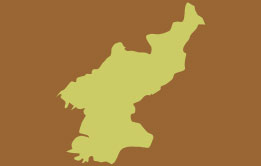Control of media and information in North Korea goes well beyond what might be called “censorship” in most any other country. The authoritarian regime of Kim Jong Il manages and constrains virtually every facet of news creation, distribution, and access — including the very ideas and opinions of both media makers and consumers.
North Korea consistently ranks last among the world’s nations in international ratings of press freedom. Newsgathering and dissemination are dominated by the Korean Central News Agency (KCNA) and other outlets for state propaganda which ceaselessly praise the regime, denounce its opponents, and generally ignore domestic famines and other internal crises. For the most part, journalists simply do not pass its borders. When foreign journalists are allowed in — or, more rarely, when North Korean journalists travel out — it is only to visit approved locations while under careful supervision of government chaperones. Aside from the few officials charged with monitoring the external world, those seeking foreign media in any form risk imprisonment and forced labor.
Advances in technology have not, thus far, led to change. All televisions and radios must be registered and customized to prevent reception of any non-governmental broadcast signals. Technologies like satellite television and the Internet — somewhat successful in evading censorship in other repressive states — have been thwarted here by a combination of government controls, limited phone networks, and antiquated technology. One of the more consistent sources of news about life inside the country are defectors who risk jail, or worse, by crossing the border into China.
Perhaps the most effective element of all, the North Korean government is known to control its people’s experiences and perceptions, while cultivating faith in and devotion to the nation’s Great Leader. These attitudes appear to prevail among the nation’s journalists, as well: In August, 2003, North Korean journalists visited the World University Games in Daegu, South Korea, an event promoting reconciliation between the two countries. They showed their devotion to their head of state by scolding and attacking South Korean protesters carrying placards criticizing Kim Jong Il.
- Previous: Italy
- Next: Philippines



